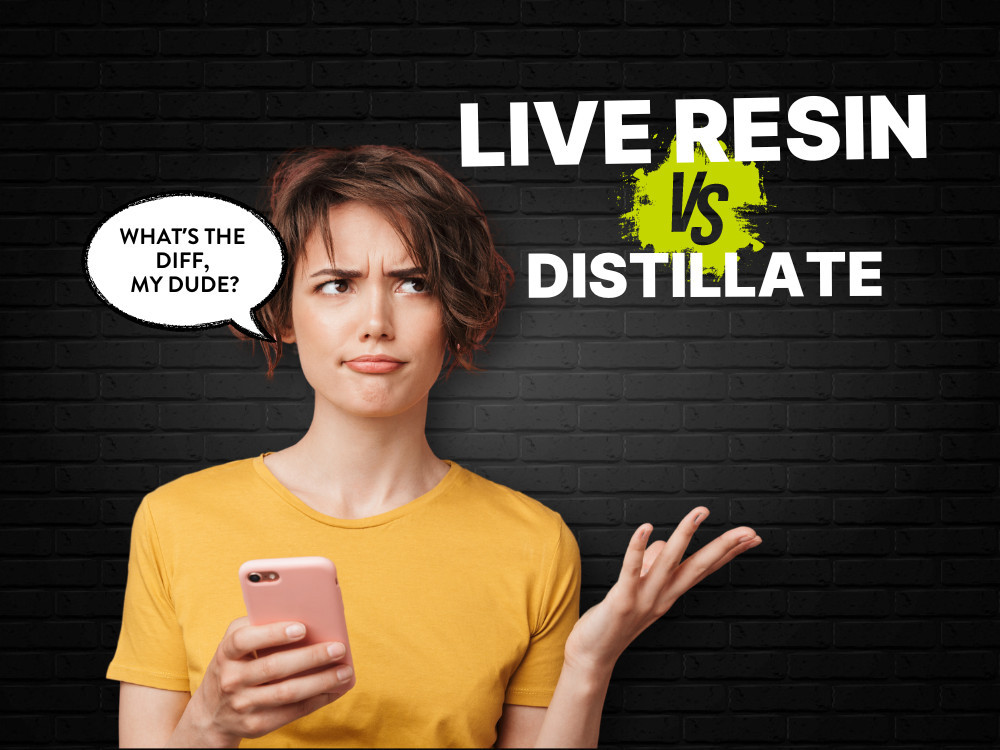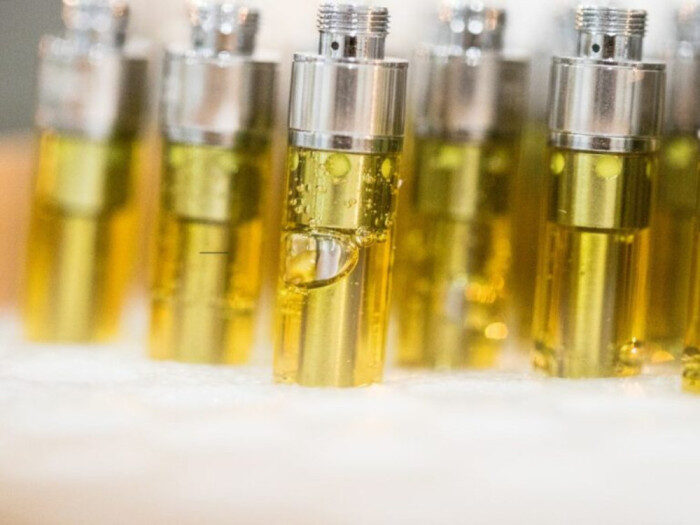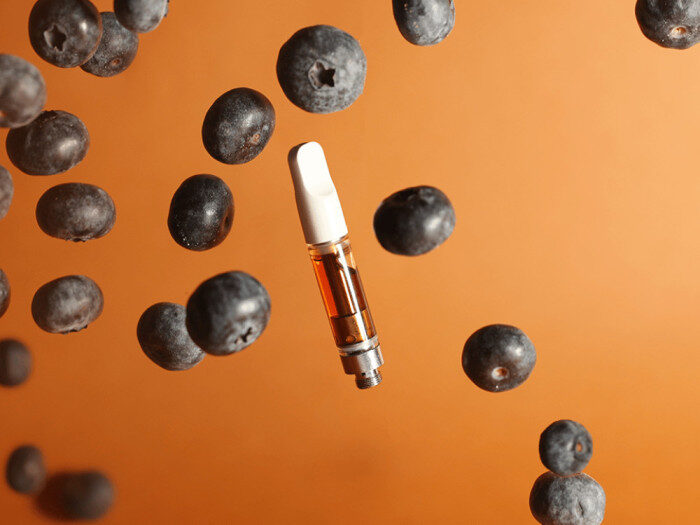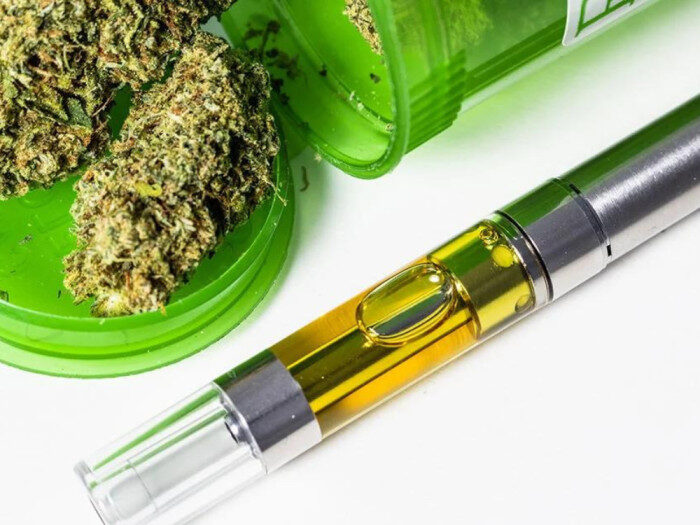
May 27, 2024
Decoding the Differences: Live Resin vs. Distillate 510 Vape Cartridges
Live resin cartridges and distillate cartridges both contain concentrated cannabis oil, but their production processes and resulting compositions vary significantly. Live resin is renowned for its potency and rich flavor profile, achieved through a unique extraction method that preserves the plant's natural terpenes. Unlike traditional extraction methods that involve drying and curing the cannabis plant before processing, live resin is made from freshly harvested, flash-frozen cannabis flowers. This preserves the delicate compounds, including cannabinoids and terpenes, resulting in a product that captures the essence of the plant in its purest form.
SHOP 510 Cartridges
ST. CATHARINES | WELLAND (Niagara Street) | FORT ERIE | WELLAND (East Main)

On the other hand, distillate cartridges are produced using a refinement process that strips the cannabis oil of all impurities, including terpenes and other plant matter. The result is a highly potent and refined product with a clear appearance and minimal flavor profile. Distillation involves heating the cannabis oil to vaporize the cannabinoids, then condensing the vapor back into a liquid form. This process effectively separates the cannabinoids from the terpenes and other compounds, resulting in a product that is almost pure THC or CBD.
One of the key differences between live resin and distillate cartridges lies in their terpene content and flavor profile. Live resin cartridges are prized for their robust flavor and aroma, thanks to the presence of naturally occurring terpenes. These compounds not only contribute to the overall sensory experience but also enhance the entourage effect, a phenomenon in which the combined effect of cannabinoids and terpenes produces a more potent therapeutic effect. In contrast, distillate cartridges lack the complex flavor profile of live resin and are often described as having a neutral or "clean" taste.

Another important distinction between live resin and distillate cartridges is their cannabinoid content. While both products contain high concentrations of THC or CBD, the presence of other cannabinoids may vary. Live resin cartridges typically retain a broader spectrum of cannabinoids, including THC, CBD, CBG, and others, due to the preservation of the plant's natural composition. This can result in a more balanced and nuanced effect, as each cannabinoid interacts with the body's endocannabinoid system in different ways. Distillate cartridges, on the other hand, contain primarily THC or CBD, with minimal amounts of other cannabinoids present.
When it comes to choosing between live resin and distillate cartridges, it ultimately comes down to personal preference and desired effects. If you prioritize flavor and aroma and enjoy the entourage effect, live resin cartridges may be the ideal choice for you. On the other hand, if you prefer a more potent and refined product with a neutral taste, distillate cartridges may better suit your needs.

In conclusion, live resin and distillate cartridges offer distinct vaping experiences, each with its own set of advantages and characteristics. Whether you're drawn to the rich flavor and terpene profile of live resin or the potency and purity of distillate, there's a 510 vape cartridge out there to suit your preferences. By understanding the differences between these two products, you can make an informed decision and enhance your vaping experience accordingly.
SHOP 510 Cartridges
ST. CATHARINES | WELLAND (Niagara Street) | FORT ERIE | WELLAND (East Main)
What is live resin?
Live resin is a cannabis concentrate made from fresh-frozen cannabis flowers that are cryogenically preserved to retain the plant's original terpene profile.
What is distillate?
Distillate is a cannabis extract that undergoes a purification process to isolate specific cannabinoids, typically resulting in a high-potency THC or CBD product.
How are live resin vape cartridges made?
Live resin cartridges are made by extracting cannabinoids and terpenes from freshly harvested cannabis flowers using solvents like butane or CO2. The extract is then refined and placed into vape cartridges without losing the original terpene profile.
How are distillate vape cartridges made?
Distillate cartridges are made by refining cannabis extract through processes like distillation, removing impurities and other compounds to isolate THC or CBD. The resulting distillate is then mixed with terpenes or flavorings and added to vape cartridges.
What is the main difference between live resin and distillate?
The main difference lies in their production methods and composition. Live resin preserves the original terpene profile of the cannabis plant, while distillate is a purified form of cannabinoids with added flavors or terpenes.
How do live resin and distillate cartridges differ in taste?
Live resin cartridges often have a richer, more complex flavor profile due to the preservation of the plant's natural terpenes, while distillate cartridges may have a more subtle or artificial flavor.
Which one is more potent, live resin, or distillate?
Distillate cartridges typically have higher cannabinoid concentrations and are therefore considered more potent than live resin cartridges, which retain a broader range of compounds including terpenes.
Are there any differences in the extraction process between live resin and distillate?
Yes, the extraction process for live resin involves freezing freshly harvested cannabis flowers to preserve volatile compounds, while distillation involves heating and cooling to separate cannabinoids from other plant material.
Can you explain the extraction method used for live resin?
Live resin extraction involves using solvents like butane or CO2 to extract cannabinoids and terpenes from fresh-frozen cannabis flowers, preserving the plant's natural profile.
Can you explain the extraction method used for distillate?
Distillate extraction typically involves multiple steps including winterization, decarboxylation, and distillation to isolate and purify cannabinoids from cannabis extract.
What is the cannabinoid profile of live resin compared to distillate?
Live resin retains a more diverse cannabinoid profile, including cannabinoids, terpenes, and other compounds, whereas distillate is primarily composed of isolated THC or CBD.
Do live resin cartridges contain more terpenes than distillate cartridges?
Yes, live resin cartridges contain a higher concentration of natural terpenes compared to distillate cartridges, which may have added or synthetic terpenes.
How do live resin and distillate cartridges differ in color?
Live resin cartridges often have a darker color due to the presence of natural compounds, while distillate cartridges are typically lighter and clearer in appearance.
Are there any differences in the consistency of live resin and distillate?
Live resin may have a more viscous consistency due to the presence of terpenes and other compounds, whereas distillate is often more fluid and homogeneous.
Which one is more expensive, live resin, or distillate cartridges?
Live resin cartridges are generally more expensive due to the complexity of the extraction process and the higher concentration of natural compounds compared to distillate cartridges.
How do live resin and distillate cartridges differ in terms of effects?
Live resin cartridges may provide a more well-rounded and nuanced high due to the entourage effect of cannabinoids and terpenes, while distillate cartridges may offer a more standardized and predictable experience.
Are there any differences in the potential health benefits between live resin and distillate?
Both live resin and distillate cartridges offer potential health benefits associated with cannabinoids, but live resin may provide additional benefits from the synergistic effects of cannabinoids and terpenes.
Can live resin and distillate cartridges be used interchangeably?
Yes, both types of cartridges can be used with compatible vape pens, but users may notice differences in taste, potency, and effects.
How do live resin and distillate cartridges differ in shelf life?
Distillate cartridges generally have a longer shelf life due to the removal of volatile compounds during the extraction process, while live resin cartridges may degrade more quickly over time.
Can you use live resin and distillate cartridges with the same type of vape pen?
Yes, as long as the vape pen is compatible with 510-threaded cartridges, both live resin and distillate cartridges can be used interchangeably.
Do live resin and distillate cartridges have different recommended storage methods?
Live resin cartridges should be stored in a cool, dark place to preserve their terpene profile, while distillate cartridges can be stored at room temperature without significant degradation.
Can live resin and distillate cartridges be mixed together?
Yes, users can mix live resin and distillate cartridges to customize their vaping experience, although the resulting effects and flavor may vary.
Are there any legal differences between live resin and distillate?
In most jurisdictions, there are no specific legal differences between live resin and distillate, although regulations may vary regarding labeling and potency testing.
How do live resin and distillate cartridges differ in terms of availability?
Distillate cartridges are more widely available due to their simpler production process and longer shelf life, while live resin cartridges may be less common and more sought after by connoisseurs.
Which one is better suited for medical use, live resin, or distillate cartridges?
Both live resin and distillate cartridges can be used for medical purposes, but patients may prefer live resin for its potential entourage effects and broader range of therapeutic compounds.
Join our mailing list to receive exclusive details on new arrivals, product recommendations, sales, discounts, events and more.
111 Fourth Avenue, Unit 9
St. Catharines, Ontario
(905) 397-4207
310 Garrison Rd
Fort Erie, Ontario
(905) 871-4420
623 Niagara Street
Welland, Ontario
(289) 820-8432
469 East Main St
Welland, Ontario
(289) 820-6370





